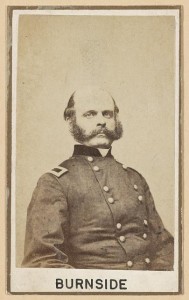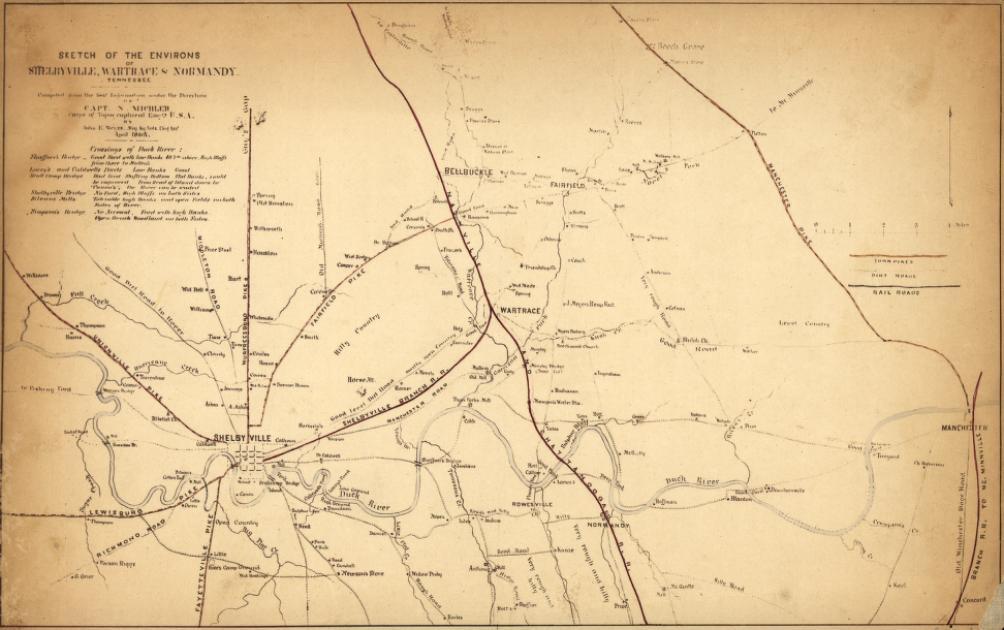From a Seneca County, New York newspaper in May 1863:
The Hon. CLEMENT L. VALLANDIGHAM reached Murfresboro [sic], Tenn., on the 24th inst., and was escorted to the rebel lines. – the rebel pickets at first refused to receive him, but finally the colonel commanding the pickets assented to his reception, when Mr. VALLANDIGHAM thus addressed the guards, at the same time asking the federal officers who had him in charge to pay attention to his words: “I am a citizen of Ohio, of the United States of America, sent within your lines against my will, and hope you will receive me as your prisoner.” – the rebel commander then promised that he would send Mr. Vallandigham to the rebel authorities at Shelbyville at his earliest convenience.
According to the 1872 biography (pages 297-300) by Clement Vallandigham’s brother James, Clement arrived in Murfreesboro in the evening of the 24th and had a mostly (after initial verbal hostilities) pleasant conversation with General Rosecrans. On the morning of the 25th he was escorted to the rebel pickets and made his declaration mentioned above. In the afternoon he was taken by ambulance to Shelbyville, where he was received by General Bragg.
The May 30, 1863 issue of Harper’s Weekly (at Son of the South) criticized the Lincoln administration’s handling of dissent as being a symptom of not trusting the Northern people:
… But the question is not whether Vallandigham be a traitor, or whether war involve a suspension of individual rights: it is—shall we better ourselves and help the country by locking this man up in a fortress, instead of letting him prate his seditious trash to every one who will listen? To that question the reply must be in the negative.
The mistake which has all along been made in this war by the Government and many of its agents has been not trusting the people sufficiently. Arresting seditious talkers implies a fear that the people have not sense or strength of mind enough to resist the appeals of sedition; just as the suppression or retention for a time of intelligence of a defeat implies a doubt whether the people have courage enough to bear bad news. Let us assure Mr. Lincoln, and all in authority under him, that the people of the United States have quite courage enough to bear any amount of misfortunes, and quite sense enough to withstand any amount of seditious nonsense, be it uttered ever so glibly. The only effect thus far produced by such talkers as Vallandigham has been to kill off the Copperhead sentiment in the Northwest, to reduce Fernando Wood’s party to a mere corporal’s guard, and to render the names of the Copperhead leaders a by-word and a reproach among honest men. Vallandigham was fast talking himself into the deepest political grave ever dug when Burnside resurrected him. ….
The June 13th issue of Harper’s maintained that Vallandigham represented a class of would-be martyr’s who tried to exploit their punishment for political gain. It wouldn’t work:
As to the smart talkers and writers who are aiming at the Capitol or the White House by way of Fort Lafayette, we fear their ambition will be disappointed. The price of provisions is advancing daily, and the Government is already at expense enough for the support of troops, without undertaking to fatten traitors likewise. It would be no small gain to many of these New York and New Jersey patriots, who declaim against the destruction of our liberties, to get their board gratis this summer. But Mr. Lincoln can not afford such luxuries. The peace orators had far better give up the idea of getting free board and lodging, with eventual contingencies in the shape of a martyr’s reputation, and betake themselves to some honest trade.

![Hon. Clement Laird Vallandigham [?] of Ohio (between 1855 and 1865; LOC: LC-DIG-cwpbh-01194)](https://www.bluegrayreview.com/wp-content/uploads/2013/05/01194r-215x300.jpg)

